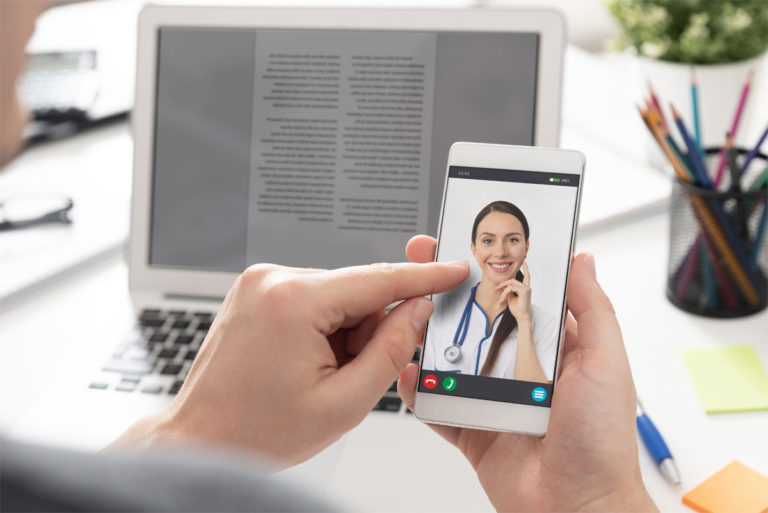Table of Contents
The prevalence of mental health problems among college students is increasing. According to a new report by the Student Experience in the Research University Consortium (SERU), about one-third of undergraduate, graduate, and professional school students screened during the summer were found to have depression or anxiety, which is a higher rate than in years past. Students also say COVID-19 has made it harder to access mental health services. Here are the facts that higher education leaders need to make sound decisions about telehealth for colleges.
College student populations are prone to stress, anxiety, and depression. The strain of living away from home for the first time, forming new relationships with peers and teachers, and academic concerns can feel overwhelming. Additionally, the mental health crisis at colleges and universities has gone from bad to worse due to COVID-19. The Centers for Disease Control and Prevention (CDC) reports 1 in 4 people ages 18 to 24 “seriously considered suicide” in the last 30 days. While college students are at a lower risk of experiencing serious symptoms caused by COVID-19, they are at disproportionately high risk for suicide.
Making matters worse, students with mental health issues aren’t always comfortable asking for help or they may not have the resources to afford in-person counseling sessions. Combine that with a shortage of healthcare providers, and higher education leaders are pressed to find new ways to support students.
What COVID-19 did for telehealth services
The college experience changed dramatically as a result of COVID-19, making telehealth more accessible than ever before. Of course, the continued broad adoption of telehealth is impacted by government policies implemented at the start of the pandemic when the federal Medicare program and private insurers loosened restrictions limiting the use of virtual healthcare services. But there are indicators this legislation will remain lax going forward. In a joint letter to Congressional leaders, the American Telemedicine Association (ATA) and a host of telehealth industry groups urged Congress to keep the relaxed changes in place after the national health emergency is declared over.
Telehealth won’t be the only way to access care in the future, but it’s becoming more commonplace. By some estimates, nearly 25% of all care in the future could be delivered remotely. The U.S. telehealth market reached around $10 billion in 2020 with an 80% year-over-year growth due to COVID-19. What’s more, the telehealth market is predicted to exceed $175 billion by 2026, suggesting that telehealth services will continue to be implemented for more populations, including college students.
The Coronavirus Aid, Relief and Economic Security Act (CARES) made telehealth more accessible than ever before. And in the past year, higher education professionals have learned much about telehealth and what it could mean for college students. As the impact of COVID-19 continues, the CDC advised, “leveraging telemedicine technologies and self-assessment tools to prevent further spread and help flatten the curve.” Telehealth can play a vital role in helping colleges return to some sense of normalcy, while providing enhanced access to high-quality, on-demand healthcare services.
How Generation Z engages with healthcare technology
Young adults born between 1995 and 2012 are gaining a more prominent voice in healthcare, prompting organizations — as well as colleges and universities — to adapt to new healthcare experiences. This segment of the population known as Generation Z accounts for 61 million new employees in the workforce. Here are three things to know about Gen Z’s attitudes toward virtual healthcare:
1. Gen Z is comfortable with telehealth services
Among millennials, Gen X, baby boomers, and the silent generation, Gen Z is most likely to choose virtual care over in-person experiences — 41% compared to 33% of millennials, 22% of Gen X, 9% of baby boomers, and 7% of the silent generation.
2. Gen Z is most likely to try virtual care
Gen Z feels most comfortable with participating in telehealth visits from tech or social media companies and retail brands. Nearly half of Gen Z said they would try virtual care from a tech company, and over one-third would try virtual care from a retail brand.
3. Gen Z wants more tech integrations in the patient experience
Because Gen Z is comfortable with digital healthcare, hospitals and health systems have tried new efforts to keep them engaged. For example, Boston Children’s Hospital rolled out interactive screens in its lobby and installed Amazon Alexa devices in inpatient rooms to create a personalized experience.
Discover why higher education should choose telehealth
Telehealth complements higher education’s resources
The results of the American Council on Education’s (ACE) latest Pulse Point Survey of 268 college and university presidents show higher ed leaders are increasingly concerned about the mental health of their students. Nearly 70% of presidents identified student mental health among their most pressing issues compared to 53% in the last survey. To support the mental health and well-being of their campus community, nearly 6 out of 10 college presidents report that their institutions have “invested in virtual or teletherapy services.”
Here are a few examples of how telehealth can complement college and university resources:
1. 24/7/365 accessibility
For campuses that already have healthcare services, telehealth offers 24/7/365 access that extends beyond business hours. “With 24/7 access to mental health resources, students can still access a supportive, knowledgeable provider even when the counseling center is closed,” said Dr. Jan Hall, TimelyCare executive director of mental health. “At the end of the day, into the night, and even on weekends, students can receive emotional support for any need, including critical situations. The flexibility of telehealth enables students to get support anytime and anywhere, which is particularly beneficial if the student is not on campus.”
2. Consistent care that fills gaps
For the more than 20% of higher education institutions that do not offer health services, telehealth can serve as the primary source of healthcare for students. If a student requires in-person care for health care needs, a medical or mental health provider is able to provide referrals to the appropriate facility or resource based on the institution’s protocols.
3. Patient volume management
Telehealth services accommodate surges in patient volume and can allow health centers to handle an influx of patients by remotely accessing an expanded network of licensed, board-certified physicians, nurse practitioners, physician assistants, licensed counselors, and behavioral health specialists.
4. No-cost visits
Telehealth services vary, but some partnerships like the ones with TimelyCare enable students to access no-cost medical and mental health visits, which removes financial and/or insurance worries.
5. Cost-effective resources
As budgets get tighter in higher education, decision-makers have to move beyond simply cutting budgets to looking at efficiently and effectively allocating resources. Telehealth provides efficient, cost-effective access that optimizes existing healthcare resources to provide care for students when and where they need it.
In this case study, you can see how California community colleges used telehealth to care for the needs of students when medical and counseling services weren’t available.
Telehealth increases access to care to help improve student outcomes
The connection between mental health issues and student retention has implications for the economic wellness of students and institutions alike. Specifically, the negative effects of mental health problems on student retention suggest that institutional investments in student mental health are likely to positively impact tuition revenues for institutions and the number of students who are retained and graduate.
Despite this fact, higher education leaders have given less attention to student mental health than to other comparable factors known to affect college student retention, including financial stress, social connectedness, sense of belonging, and academic preparedness. Results show that across all types of campuses, students with mental health problems are twice as likely to leave an institution without graduating. So, improving student mental health can improve academic performance, persistence, and graduation rates. Investing in student mental health makes both academic and economic sense for higher education institutions.
To help campus leaders advocate for additional investments in student mental health, the Healthy Minds Network created the Return-on-Investment (ROI) Calculator. The online ROI Calculator has parameters that can be customized with institutional details, including population size, retention rate, and prevalence of depression. Using these parameters, the ROI Calculator estimates the expected return on new investment in student health. These estimates show the tuition dollars retained as a result of averting mental health-related drop-outs, demonstrating the economic benefits of investing in student health.
Helping students manage stress will help improve student outcomes
College students are ready to use a telehealth program as a mental health resource. In a recent study of college students by TimelyCare, 75% of students said they’re open to utilizing telehealth to receive mental health care. And 20% of students shared that they “definitely would” consider using telehealth for mental health support. Of the students who had previously used telehealth services, 65% reported that they were “satisfied” or “very satisfied” with their experiences using telehealth.
Care delivered through telehealth is fast, easy, and efficient. It eliminates wait times, reduces the stigma of seeking mental, and medical care, and is available the moment a student needs care. When students don’t have to wait days or weeks for a counseling center appointment, there is bound to be a positive effect on campus health and wellness. And prospective students are evaluating mental health services at schools as a differentiator, which impacts enrollment.
Contact TimelyCare to learn how mental and physical telehealth for colleges can make a difference in the lives of your students.






